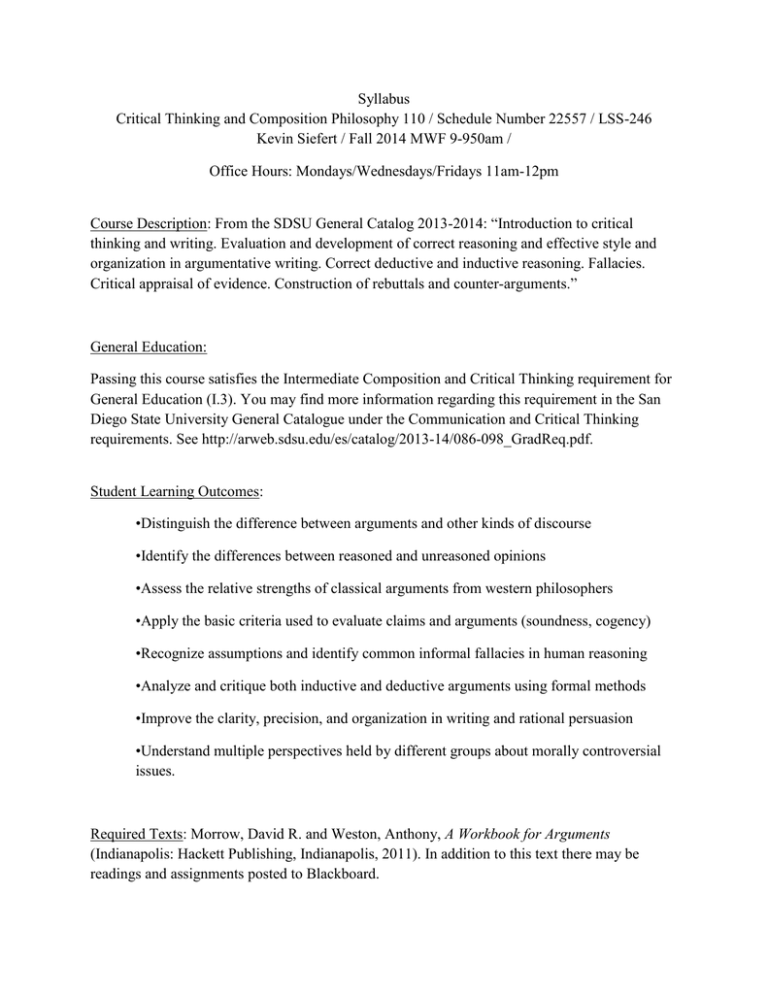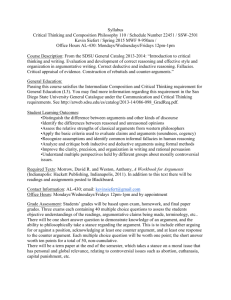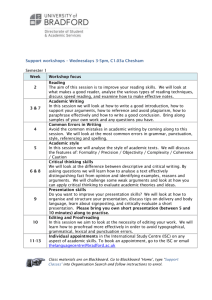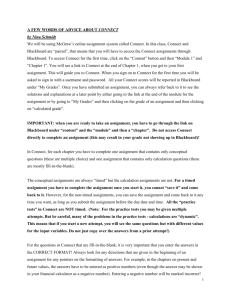Phil 110 Critical Thinking (Siefert) (F 2014)
advertisement

Syllabus Critical Thinking and Composition Philosophy 110 / Schedule Number 22557 / LSS-246 Kevin Siefert / Fall 2014 MWF 9-950am / Office Hours: Mondays/Wednesdays/Fridays 11am-12pm Course Description: From the SDSU General Catalog 2013-2014: “Introduction to critical thinking and writing. Evaluation and development of correct reasoning and effective style and organization in argumentative writing. Correct deductive and inductive reasoning. Fallacies. Critical appraisal of evidence. Construction of rebuttals and counter-arguments.” General Education: Passing this course satisfies the Intermediate Composition and Critical Thinking requirement for General Education (I.3). You may find more information regarding this requirement in the San Diego State University General Catalogue under the Communication and Critical Thinking requirements. See http://arweb.sdsu.edu/es/catalog/2013-14/086-098_GradReq.pdf. Student Learning Outcomes: •Distinguish the difference between arguments and other kinds of discourse •Identify the differences between reasoned and unreasoned opinions •Assess the relative strengths of classical arguments from western philosophers •Apply the basic criteria used to evaluate claims and arguments (soundness, cogency) •Recognize assumptions and identify common informal fallacies in human reasoning •Analyze and critique both inductive and deductive arguments using formal methods •Improve the clarity, precision, and organization in writing and rational persuasion •Understand multiple perspectives held by different groups about morally controversial issues. Required Texts: Morrow, David R. and Weston, Anthony, A Workbook for Arguments (Indianapolis: Hackett Publishing, Indianapolis, 2011). In addition to this text there may be readings and assignments posted to Blackboard. Contact Information: AL-430; email: kevinsiefert@gmail.com Office Hours: Mondays/Wednesdays/Fridays 11am-12pm and by appointment Grade Assessment: Students’ grades will be based upon exam and homework grades. Exams will make up 60% of the students’ grades. Three exams each containing 40 multiple choice questions to assess the students objective understandings of the readings, argumentative claims being made, terminology, etc.. There will be one short answer question to demonstrate knowledge of an argument, and the ability to philosophically take a stance regarding the argument. This is to include either arguing for or against a position, acknowledging at least one counter argument, and at least one response to the counter argument. Each multiple choice question will be worth one point; the short answer worth ten points for a total of 50 points, non-cumulative. There will be a term paper instead of a final exam, which takes a stance on a moral issue that has personal and global relevance, relating to controversial issues such as abortion, euthanasia, capital punishment, etc. This term paper will constitute 20% of the student’s final grade. Homework will consist of completing exercises that demonstrate the proper application of the terminology and analyzing arguments. Written responses will also be included as homework, which will be based off of material covered in lectures. Homework assignments will make up 20% of the student’s final grade. Attendance: Attendance will not be taken but is expected. Philosophy requires participation in order to be engaging. If you do not show up to class you should not expect a strong grade on your exams. Homework Assignments: There will be homework assignments collected in class as dictated on the syllabus (See course schedule for a more in depth description of assignments). Assignments will be given in class. If you are absent the day that homework is assigned, please contact me to find out what the assigned homework is. Late assignments will not be accepted. As previously stated, homework will make up 20% of the student’s final grades. Laptops/Computers: Due to the tendency of students to use laptops for purposes outside of classwork, laptops will not be allowed in class. We will be using the textbook for most in class assignments and if blackboard is needed I will use the projector in order to view the assignment. Extra Credit: There will be extra credit opportunities throughout the semester made available to help increase students' grades. These opportunities are not meant to give a dramatic increase to any student's grade, but offer minor help. Participation within the philosophic community is encouraged and attending Philosophy Club on campus or attending other philosophic events in the San Diego community will be rewarded. Attendance of such events will add 1 point to the lowest exam grade received, with a maximum of 2 points being added to any one exam. There will also be the possibility of small 10 minute presentations related to the reading materials assigned later in the semester, which we will discuss in future weeks. Grades: There will be no make up exams offered (unless there is a truly dire emergency of which I will determine the proper course of how to make up the missed exam). Your grade will be calculated from your exams and homework using the following system: 93 – 100% = A 90 – 92% = A87 – 89 % = B+ 83 – 86% = B 80 – 82% = B77 – 79% = C+ 73 – 76% = C 70 – 72% = C67 – 69% = D+ 63 – 66% = D 60 – 62% = D0 – 59% = F Students with Disabilities: If you are a student with a disability and believe you will need accommodations for this class, it is your responsibility to contact Student Disability Services at (619) 594-6473. To avoid any delay in the receipt of your accommodations, you should contact Student Disability Services as soon as possible. Please note that accommodations are not retroactive, and that accommodations based upon disability cannot be provided until you have presented your instructor with an accommodation letter from Student Disability Services. Your cooperation is appreciated. Class Schedule (This schedule is only tentative and subject to change as the semester progresses): Week 1: Read Introduction and Chapter 1: Short Arguments. Week 2: Continue Chapter 1; Read Chapter 2: Generalizations. Week 3: Read Chapter 3: Arguments by Analogy and Chapter 5: Arguments about Causes Assignment 1 due (Last day of class that week). Week 4: Read Chapter 6: Deductive Arguments. Assignment 2 due (Last day of class that week) Week 5: Read Appendix I: Fallacies and Appendix II: Definitions. Exam 1 (Last day of class that week). Week 6: Read Chapter 7: Extended Arguments. Assignment 3 due (Last day of class that week). Week 7: Read Chapter 8: Argumentative Essays. Assignment 4 due (Last day of class that week). Week 8: Read Chapter 4: Sources. Assignment 5 due (Last day of class that week). Week 9: Read ‘Sample Essays’ and ‘Guide to Writing a Philosophy Paper’ (found online on Blackboard). Week 10: Exam 2 (First day of class that week) Read ‘Reading Packet 1’ (Blackboard). Week 11: Read ‘Reading Packet 2’ (Blackboard). Assignment 6 due (Last day of class that week). Week 12: Read ‘Reading Packet 3’ (Blackboard). Week 13: Read ‘Reading Packet 4’ (Blackboard). Week 14: Continue Philosophic Readings (Blackboard) Week 15: Exam 3 (Last day of class that week). Week 16: Review of concepts thus far discussed hold; office hours for further guidance in writing the final assignment. Final Exam Week: Final Paper due (Refer to the school catalog for final exam date).



